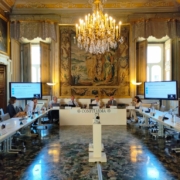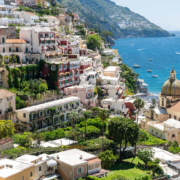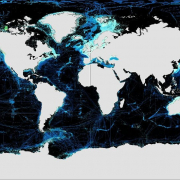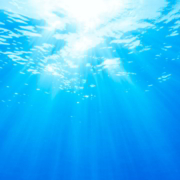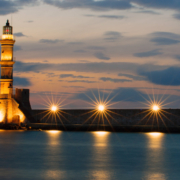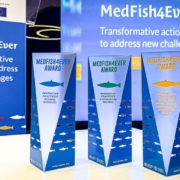Paths to decarbonisation: cross-sea basin synergies Workshop
European Maritime Days | 24 May 2023 | Brest, France
Exploring concrete paths for an enlarged regional cooperation towards decarbonisation of the blue economy
The full decarbonisation of the blue economy is becoming more and more relevant for the EU and its neighbouring countries, and it remains a truly cross-cutting challenge for the three participating sea basins strategies in the Atlantic, the WestMED and the Black Sea.
In this context, the workshop ‘Paths to decarbonisation: cross-sea basin synergies’ organised within the EMD 2023 in Brest, France, embedded a rich and moderated discussion amongst a panel of high-level policy representatives from the EU Commission and Presidencies/Representatives for each of the three Sea Basin Strategies, followed by a moderated Q&A session amongst participants and the audience.
In the first part of the workshop, the state of play across the European sea basins was reviewed in detail, while identifying the possible EU-wide synergies to be activated towards a fully decarbonized sustainable blue economy. In this respect, specific support is offered through the EU Sea Basin Strategies[1], as promoted by the EU Commission in partnership with EU Member States and neighbour Countries across the Atlantic (Atlantic Action Plan)[2], the western Mediterranean (WestMED Initiative) [3] and the Black Sea (Common maritime Agenda)[4].
Existing relevant actions and concrete success stories were highlighted by the representatives of the 3 geographies. Relevant actions included:
- The Atlantic Action Plan actively supporting renewable energy uptake through dedicated actions (i.e. ‘pillars’) aimed at carrying out technical exchanges and discussing future project ideas;
- The WestMED Initiative identifying Green Shipping and Sustainable Aquaculture as priorities, via specific technical groups, both relying on sustainable and green energy;
- The implementation of the Common Maritime Agenda (CMA) for the Black Sea needing specific skills and know how to accelerate a transition towards decarbonisation.
As relevant success stories portrayed as concrete deliverables and contributions towards the implementation of the EU sea basin support – i.e. towards fostering a full decarbonisation of the blue economy, the following were examined:
- Atlantic Action Plan provided examples of aligned projects in the field of green and smart ports, such as AspBAN, MAGPIE or PIONEERS.
- WestMED included among examples of concrete success stories the well-established Technical Groups (and related projects) on Green Shipping/Ports, Sustainable Aquaculture “AquaWest, the Maritime Clusters Alliance and the recently launched Community of Practice on MSP
- Finally, Black Sea illustrated success stories with projects supported through EMFAF such as 4BIZ, or DBAN on acceleration of innovation ecosystems and the focus on coastal protection and sustainable entrepreneurship.
Building on existing actions, during the second part of the workshop, concrete areas for further support and synergies/cooperation across the different sea basins – both in terms of policy and project-support were discussed:
- Firstly, to pool and identify both strengths and weaknesses in each of the three sea basins, and based on this information, to identify common elements for collaboration. This analysis could be entrusted to the Assistance Mechanism which, in the context of the new contract with CINEA, works jointly in the three geographies.
- Secondly, identifying structured opportunities for cross-sea basin policy dialogue. This could be translated in the first place into the participation of the respective Presidencies in the Steering Committees of the other two sea basins.
- This recurrent presence of representatives of the different maritime strategies in the other governance structures could eventually lead to the creation of a common platform for dialogue between the three geographies, and this dialogue could incorporate elements of policy and more concrete elements of projects or initiatives.
- Establishing a concrete programme of exchanges between existing Technical Groups & Pillars on common topics
- Stimulate the creation of cross-sea basin consortia for EU-wide calls in programmes such as Interreg VI C 2021-2027 (interregional cooperation), Horizon, ERASMUS, LIFE…
- Promote the exchange on good practices and cooperation amongst policy and science within/across sea basins
- Including all the points above, establishing a basic and straight forward collaboration plan setting up the different stages and an overall timeline.
- Finally, the organisation in 2024 of a first ever cross-sea basin fertilisation event, whereby authorities and stakeholders from the Atlantic, the Western Mediterranean and the Black Sea could participate and exchange on all the topics mentioned above. More information on this planned conference will be shared as soon as it is available.
As a conclusion, the workshop –which was the first of its kind bringing in representatives from the 3 Sea basins and the European Commission to discuss about synergies– allowed for the identification of concrete and relevant opportunities for stronger cross-sea basin coordination and synergies, both at the policy as well as technical levels, with the ultimate objective of further streamlining overall cross-sea basins cooperation across the EU towards decarbonisation.
Speakers/panellists and moderator

Speakers and Panellists (from left to right):
- Isabelle Perret Advisor for European and environmental affairs (acting) Secretariat-General for the Sea
- (WestMED Initiative representative)
- Marisa Lameiras da Silva, Portuguese Directorate-General Maritime Policy, Director (Atlantic Action Plan Initiative Presidency)
- Iglika Yakova, European Commission, DG Mare, Deputy Head of Unit
- Alexandra Bogdan, Romanian Ministry of Foreign Affairs, Director Analysis Division , (Black Sea Common Maritime Agenda Coordinator)
- Matteo Bocci, Sea Basins’ Assistance Mechanism
Overall moderation:
- Javier Fernandez, Sea Basins’ Assistance Mechanism
[1] https://oceans-and-fisheries.ec.europa.eu/ocean/sea-basins/eu-sea-basins_en

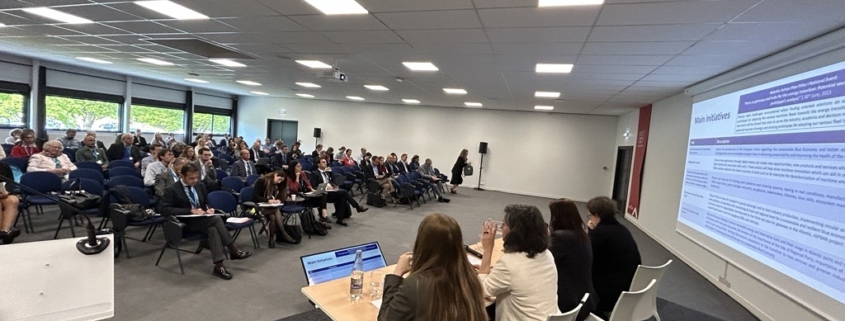
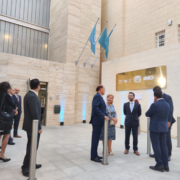
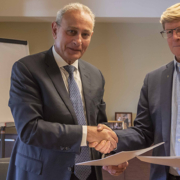 Union for the Mediterranean
Union for the Mediterranean 